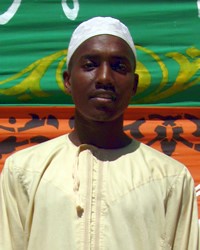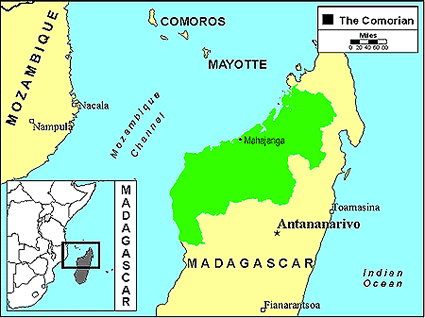Comorians (also known as the Mauri or the Mahorais), whose primary population is in the nearby islands of the Republic of Comoros, also live on the island of Madagascar, located off the southeastern coast of Africa. Their heritage can be traced back to a blend of settlers from the past: Iranian traders, mainland Africans, Arabs, Austronesians, and Malagasy. They primarily inhabit the northwestern region of the island, centering on the seaport city of Mahajanga, as well as other larger cities. A large number of the Comorians in Madagascar must be Ngazidja, from the Comoros island of the same name. The island of Madagascar, officially known as the "Democratic Republic of Madagascar," was a territory of France until 1958. Many of the Comorians now residing in Madagascar initially came to Madagascar seeking better socio-economic conditions. Others have fled Comoros during periods of political strife for safer living conditions in Madagascar. In turn, large groups of Comorians fled Madagascar in the 1970s during racial problems, but with racial tensions easing, large numbers of Comorians have migrated back to Madagascar in increasing numbers. There are also many university students from the Comoros studying in Madagascar since there is no university in their country. Although their native Comorian dialects remain their primary languages, many have learned to speak Malagasy as well over the years of living in that country.
Comorian life in Madagascar centers around commerce with most families involved in some form of trading. They maintain strong ties with families living on the four islands comprising the Comoros. The Ngazidja, as others, have most of their social networks with those from their own people and home village. Male social organization rests on age group and status. They have musical associations and sports clubs in every village. Female social organization, which is less formal, occurs through help groups and customary associations for development. Most women's organizations are devoted to community development and the training of women and youths. Ngazidgians are matrilineal, and it is customary for new families to locate close to the family of the wife. The fundamental social unit is the village or city neighborhood. Within the Ngazidja in Madagascar, loyalty to villages and relatives at home keep them somewhat separated from the local people. It is difficult to assess, but no doubt the Ngazidja in Madagascar must face the challenges that all immigrants must face, many of those different aspects of assimilation, and the subsequent weakening of traditional beliefs and practices. Could cultural and social isolation create a sense of entrapment, homelessness, and discouragement? Perhaps most indicative of a certain breakdown, moral decline has led to a large number of sexually active Comorian teenagers. This may be a tangible, and salient feature of struggles of the Nagidja in a foreign land, where the structure of their home culture and families have been damaged.
In the past, the Comorians have been very resistant to any religious change. However, more recently they have become more receptive. Any outreach through written materials would be difficult due to the high illiteracy rate.
The Comorians of Madagascar, including the Nagidja, are nearly all Shafiites, one of the most conservative of the four primary branches of Sunni Islam. Imams hold an important role in the Comorian religious experience. Surprisingly, however, mosque attendance is very low. Mixed with their Islamic practices, there is a strong involvement in occultism and spirit possession. Local folk religions have also had a strong influence on the people. Charms, magic, trances, demon possession, and curses are an integral part of their religious practices. Traditionally, the Comorians have been very resistant to any kind of religious change; however, they are gradually becoming more open to change.
The physical needs of the Ngazidje Comorians in Madagascar are numerous. Major problems in Madagascar include poverty, inadequate housing, disease, and poor roads. Educational levels are low and very few children attend school. There is a shortage of hospitals and doctors, and many suffer from illnesses and malnutrition. The aformentioned large number of sexually active teenagers, has resulted in the transmitting of venereal diseases. Such problems contribute to a high death rate. The spiritual needs of the Comorians are even greater. Though there is freedom of religion in Madagascar, evangelism is not well received by Shafiite Muslims. Their commitment to Islam, coupled with their involvement in occultic practices, has made them difficult to reach. Liberal Christianity in mission schools and seminaries has also undermined mission zeal towards the Comorians. However, the JESUS Film, gospel recordings for oral learners, and the New Testament are available to the Nagidja Comorians, hopefully also in Madagascar. In recent years there has been Bible translation work. A translation team has learned enough of their language to compose worship songs. The Ngazidje being very fond of music, so this is a good means of presenting the gospel. The majority of Comorians have had little exposure to genuine Christianity. The nature of Islam has ensured that the Comorians have remained isolated from Christian believers. However, while the opportunities to witness are very restricted in the Islamic Republic of Comoros, Madagascar does afford freedom to evangelize.
Ask the Lord to call people who are willing to go to Madagascar and share Christ until they have a powerful movement to Christ. Ask God to strengthen, encourage and protect the few known Nagidja Comorian believers. Ask the Holy Spirit to create a hunger for spiritual truth within their hearts. Pray for God to send Christian teachers and medical teams to work among the Comorians. Pray that Christ followers in Madagascar will reach out and share God's love with the Comorians.
Scripture Prayers for the Comorian, Ngazidja in Madagascar.
| Profile Source: Joshua Project |












